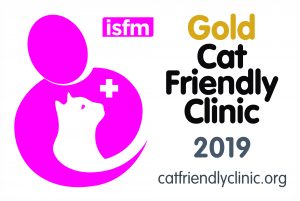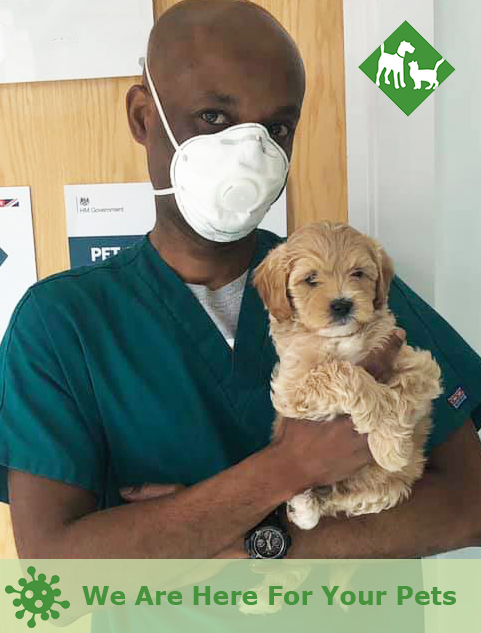In the past three months, we have seen some serious and recurring issues coming through our doors, so we thought we’d share a few of them with you – along with some tips to keep you and your pets safe during this stressful time.
Don’t Leave Things Late
During the lockdown, we have been seeing that, unfortunately, people are delaying visiting the vets. We are certainly seeing some very severe illnesses, so please don’t delay if you’re worried about your pet, please give us a call so that we can help. Due to restrictions from our governing bodies, we might need to arrange a video or phone appointment initially, which is a great way for our vets to assess the situation and advise you on the right course of action. However, as the lockdown is easing, we can increasingly see your pet for all conditions.
Upset Stomachs!
Some of the issues that we have been frequently seeing are vomiting and gastrointestinal conditions. Bear in mind that it is barbecue season so it might be easier for dogs to get hold of something they shouldn’t. Foreign bodies can be very serious so ensure any dogs do not eat anything untoward. Be careful not to change diets abruptly and keep to their normal good quality nutrition with fresh water always available.
Be extra diligent and call us as soon as you notice vomiting or any other issues.
Cat Sniffles, No It’s Not Coronavirus…
Worryingly, we’ve seen lots of cases of cat flu, perhaps suggesting that our feline friends’ vaccines are starting to wane. If your pet’s vaccinations are due then please do give us a call as we have started to take bookings again.
Keep A Lid On Lockdown Pet Stress
We have all had our normal lives and routines disrupted and are all feeling somewhat stressed. Our pets too, whilst may have enjoyed the increased company, are also showing signs of anxiety.
Dogs, in particular, are social pack animals and they love having us around, so you leaving home could be quite stressful for them and they may develop separation anxiety as we go back to our old routines. Preparing them for being left alone is about teaching them that it isn’t scary at all, but a time for them to get comfortable and relax.
![]() Make sure to leave your pet unattended for a while and get them used to you not being around. Start with a couple of minutes and gradually increase the time you stay away.
Make sure to leave your pet unattended for a while and get them used to you not being around. Start with a couple of minutes and gradually increase the time you stay away.
![]() As other pet services are opening again, there may be a waiting list so book your appointments early before your old routine comes back.
As other pet services are opening again, there may be a waiting list so book your appointments early before your old routine comes back.
![]() Making sure your pet’s microchip, vaccines and flea and worming treatment are up to date, will save you from getting stressed and your dog from dealing with pesky enemies such as fleas and lungworm.
Making sure your pet’s microchip, vaccines and flea and worming treatment are up to date, will save you from getting stressed and your dog from dealing with pesky enemies such as fleas and lungworm.
![]() Ask your neighbours or friends to help you take care of your dog while you are at work.
Ask your neighbours or friends to help you take care of your dog while you are at work.
Cats are highly independent animals and have been really quite stressed during the lockdown due to the sudden change of having us around more and the change to their daily routine. We have seen an increase of stress related problems such as cystitis, blocked bladders, over-grooming and territorial cat fights. The incidence of stress-related problems has increased dramatically in our cat patients. To try to keep our feline companions happy and healthy:
![]() Try to avoid changes to routine and stick to your routine as much as possible.
Try to avoid changes to routine and stick to your routine as much as possible.
![]() Avoid letting other cats in the premises or garden as other cats invading their territory is very stress inducing.
Avoid letting other cats in the premises or garden as other cats invading their territory is very stress inducing.
![]() Keeping your cat on a good quality premium diet can help to provide the optimal balance of vitamins and minerals. Don’t overfeed.
Keeping your cat on a good quality premium diet can help to provide the optimal balance of vitamins and minerals. Don’t overfeed.
![]() Calming products such as Feliway plug-ins can be very effective in preventing your cats from being stressed
Calming products such as Feliway plug-ins can be very effective in preventing your cats from being stressed
![]() Protective supplements such as Cystaid, Cystophan and Cystease may reduce the tendency for cats to develop urinary issues if they are prone to this.
Protective supplements such as Cystaid, Cystophan and Cystease may reduce the tendency for cats to develop urinary issues if they are prone to this.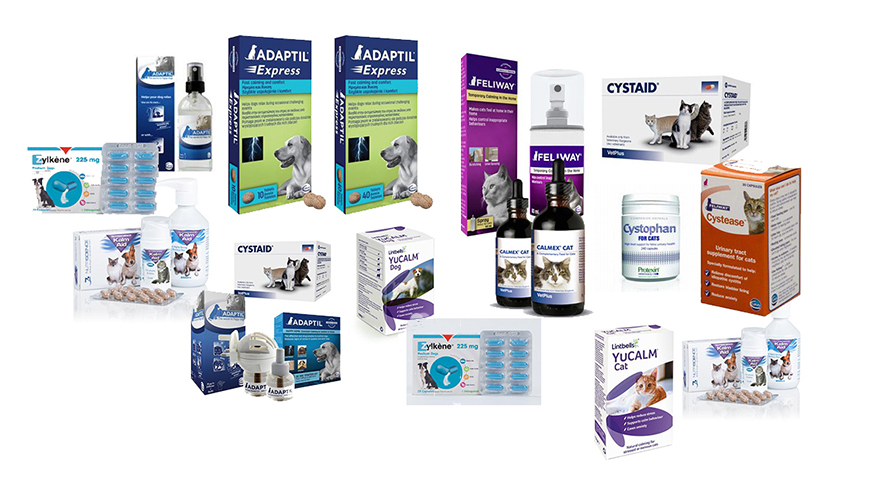
For more helpful tips to keep your pets relaxed, we have put together a blog on how to manage your pet’s stress as the lockdown eases.
Don’t Forget Flea And Worming Treatments
As we lose track of time, it’s very easy to forget about our pet’s flea and worming treatment. However, preventative care is extremely important at this time as the warm weather provides an ideal breeding ground for fleas. Unfortunately, we have been seeing many flea related illnesses and over-grooming during this time.
Lungworm is another dangerous, or fatal if not treated, parasite that it is essential to treat your dogs for. London alone has a serious Lungworm problem with over 50% of foxes infected.
Please call our surgery and we can easily get these posted or delivered to you – we only prescribe products recommended by our vets. Products that are available over the counter pet shops are often not effective and they do not treat for lungworm, ear mites and mange that could be dangerous for your pets.
Arthritis – Keeping Your Pets Mobile
The lockdown has proven a challenge for pets with arthritis. One long daily walk and reduced vet visits is not ideal for these patients. Arthritis is a very common disorder and there is much that we can do at this time to ensure we keep our pets mobile and happy –
Now that we are all spending more time indoors, it’s too easy to gain a few more pounds…And the same goes for our pets.
![]() Care with the diet. It is all too easy to gain a few pounds with extra treats at this time but please be careful not to let your pet gain weight. Avoiding obesity for an arthritic pet is very important to reduce the weight on the joints. A good quality diet is important. There are also special joint diets available – ask one of our vets or nurses for advice. There are even joint diets for overweight pets.
Care with the diet. It is all too easy to gain a few pounds with extra treats at this time but please be careful not to let your pet gain weight. Avoiding obesity for an arthritic pet is very important to reduce the weight on the joints. A good quality diet is important. There are also special joint diets available – ask one of our vets or nurses for advice. There are even joint diets for overweight pets.
![]() Be careful not to over-exercise. As the lockdown eases and we are allowed to go out more than once, it is much better to take multiple short walks instead of one long walk.
Be careful not to over-exercise. As the lockdown eases and we are allowed to go out more than once, it is much better to take multiple short walks instead of one long walk.
![]() Follow your pet’s medication guidelines as instructed by your vet. Whilst we have been limited to seeing your pet physically, we can advise on the correct medication and ensure that the correct doses and medications are given. The correct medication regime can make a significant difference to your pet’s quality of life. Ensure to have a decent supply of your medications to avoid running out and let us know if you think your current medication is not working as there are many different options
Follow your pet’s medication guidelines as instructed by your vet. Whilst we have been limited to seeing your pet physically, we can advise on the correct medication and ensure that the correct doses and medications are given. The correct medication regime can make a significant difference to your pet’s quality of life. Ensure to have a decent supply of your medications to avoid running out and let us know if you think your current medication is not working as there are many different options
![]() There are many joint supplements that can help to keep your pet mobile and happy. These can often help to keep your pet comfortable at home with a nice comfortable bed or two and avoid slippery floors.
There are many joint supplements that can help to keep your pet mobile and happy. These can often help to keep your pet comfortable at home with a nice comfortable bed or two and avoid slippery floors.
If you are unsure if your pet has arthritis – if he or she is struggling to jump up or get up from the floor, is slowing down or sore on touching then please let us know and we can help either physically or by video consult.
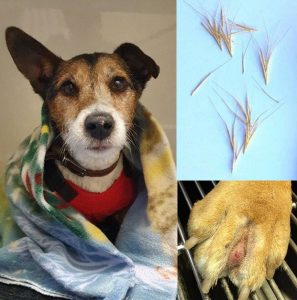
Beware The Dreaded Grass Seeds
Grass seeds are out with a vengeance this year. We’ve already seen many grass seeds and as the weather gets dry, the parks will be full again.
To ensure these pesky plants will not get a hold of your precious pet, visit your groomer and get a short trim around the ears and paws as these are the most common places grass seeds can attach to. Certain breeds such as Cocker Spaniels and other dogs with long fur are more likely to get grass seeds however all dogs are at risk.
Remember to keep their fur short and check their ears and paws regularly. Grass seeds can be very annoying for your pet so if you notice your dog shaking their head call us as soon as possible.
Puppies
During the Covid-19 lockdown, we’ve seen a huge increase in puppies being adopted across the UK. As the lockdown restrictions begin to ease, many new parents are wondering how to keep their pet’s stress to a minimum as they go back to work and how to ensure adequate socialisation.
![]() Introduce periods of time alone to habituate your puppy to being left alone. Initially, leave with plenty of toys and a food-filled chew. Stock up on chews and toys.
Introduce periods of time alone to habituate your puppy to being left alone. Initially, leave with plenty of toys and a food-filled chew. Stock up on chews and toys.
![]() Ensure your vaccines and preventative care are up to date. We can provide puppy vaccinations now as well as flea and worming treatment, including lungworm. Kennel cough is a good idea and is recommended for most puppies too. Our VIP healthcare plan is worth considering to ensure all your preventative care is covered.
Ensure your vaccines and preventative care are up to date. We can provide puppy vaccinations now as well as flea and worming treatment, including lungworm. Kennel cough is a good idea and is recommended for most puppies too. Our VIP healthcare plan is worth considering to ensure all your preventative care is covered.
![]() Get your daycare arranged – whether it be a doggie daycare or friends and family. Spending some time with them to get used to it.
Get your daycare arranged – whether it be a doggie daycare or friends and family. Spending some time with them to get used to it.
![]() Unfortunately, many puppy classes are on hold at the moment, however many dog trainers continue to provide training advice online or even offer training classes via video. We like this book for puppy training – Easy Peasy Puppy Squeezy: your simple guide to raising and training a happy puppy. By Steve Mann.
Unfortunately, many puppy classes are on hold at the moment, however many dog trainers continue to provide training advice online or even offer training classes via video. We like this book for puppy training – Easy Peasy Puppy Squeezy: your simple guide to raising and training a happy puppy. By Steve Mann.
![]() Regularly treating your puppies for fleas and worms will ensure a healthy and stress-free puppy. Please only use products recommended by your vet. Flea and worming products available over the counter are often ineffective and do not treat for dangerous parasites such as Lungworm, ear mites and mange.
Regularly treating your puppies for fleas and worms will ensure a healthy and stress-free puppy. Please only use products recommended by your vet. Flea and worming products available over the counter are often ineffective and do not treat for dangerous parasites such as Lungworm, ear mites and mange.
![]() Our amazing vets and nurses are available for remote consults to check your puppies, answer all your questions and give the flea and worming treatment your pet needs.
Our amazing vets and nurses are available for remote consults to check your puppies, answer all your questions and give the flea and worming treatment your pet needs.
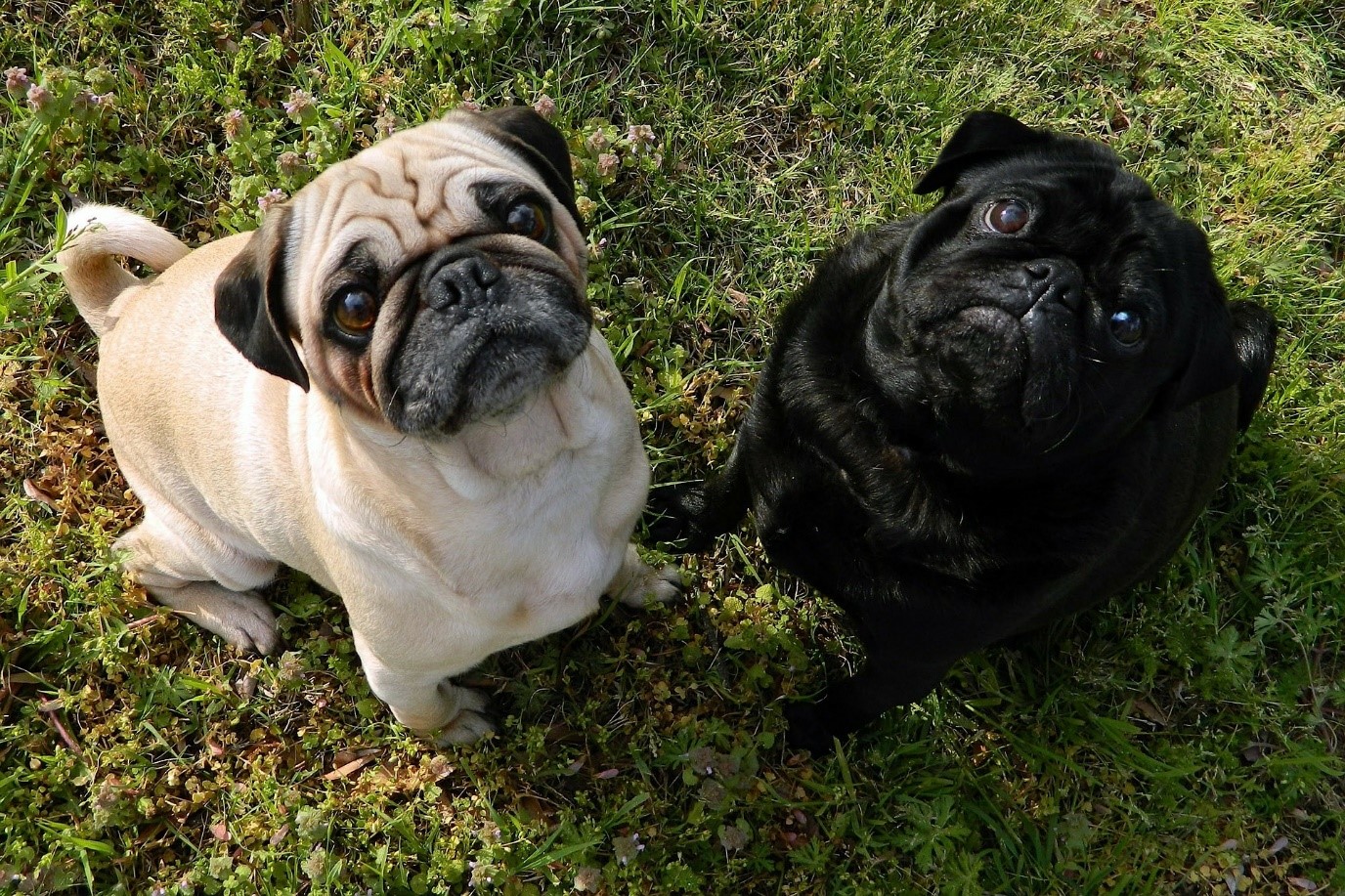
Take Care With Short Nose (Brachycephalic) Breeds
The French bulldog, English bulldog, pug, boxer and Boston terrier are all examples of brachycephalic breeds. The most distinctive feature of these breeds is their short muzzle. Unfortunately, these breeds are prone to skin and eye problems and respiratory issues. So it is important to be very careful when exercising them as they have a difficulty in oxygenating themselves properly and may struggle to breathe.
It is recommended to take them for a walk early in the morning or late in the afternoon when it is cooler – multiple short walks are preferred than one long walk – because they struggle to breathe properly and control their heat as they often struggle to cool down.
If you are worried that your dog may be struggling to breathe, call our Streatham Hill Veterinary Surgery to book a BOAS assessment with our lead surgeon Gabriella to see if we can make things easier for your dog. The BOAS assessment is a great and effective way to identify possible problems and direct you to the right course of action.
Please remember, we are here for you during this difficult time. If we can help you in any way then please just let us know.
Stay Safe.
Search Blog Articles
Blog Categories
- Advice From Your Vets (118)
- Kittens (6)
- Pet Healthcare (26)
- Puppies (17)
- Seasonal Tips (10)
- VIP Healthcare Plans (8)
- Covid-19 News (15)
- Weekly News (63)
Like Us On Facebook
Recent Posts
Archives
- May 2024
- October 2023
- July 2023
- June 2023
- March 2023
- December 2022
- September 2022
- April 2022
- December 2021
- November 2021
- October 2021
- September 2021
- August 2021
- July 2021
- June 2021
- May 2021
- April 2021
- March 2021
- February 2021
- January 2021
- December 2020
- November 2020
- October 2020
- September 2020
- August 2020
- July 2020
- June 2020
- May 2020
- April 2020
- March 2020
- February 2020
- January 2020
- December 2019
- November 2019
- October 2019
- September 2019
- August 2019
- July 2019
- June 2019
Join our surgery by registering your pet online Register now
What Our Clients Say
Jack Billing
Byron Watson
Sharon And Michael
Amanda
Miss M And Dusty


